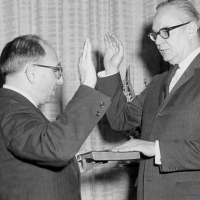Judge Rules Loyalty Oath Laws Unconstitutional for Grassroots Political Committees

Until Morro Bay resident John Barta raised a fuss, only patriotic Californians who had taken a loyalty oath were allowed to participate in grass roots politics by becoming a member of county political central committees.
But last Friday, San Luis Obispo County Superior Court Judge Martin J. Tangeman ruled that California election codes 7210, 7408 and 7655, reminiscent of loyalty oaths popularized in the 1950s during the red-baiting heyday of Senator Joe McCarthy (R-Wisconsin), were unconstitutional.
A suit filed by lawyers for Barta demanded that the oath, identical to one set out in Section 3 Article XX of the California Constitution and administered to “legislators and all public officers and employees in the executive, legislative and judicial” branches, be dropped for county central committee members. The lawsuit also asks for the state to stop supporting the codes in any fashion and notify cities and counties that the statues are unconstitutional.
The oath reads: “I, ______, do solemnly swear (or affirm) that I will support and defend the Constitution of the United States and the Constitution of the State of California against all enemies, foreign and domestic; that I will bear true faith and allegiance to the Constitution of the United States and the Constitution of the State of California.”
Stew Jenkins, a lawyer representing Barta, told the San Luis Obispo Tribune that the oath is “designed for the Legislature to control political activity” and would force an individual to uphold portions of the state Constitution, such as the provision that briefly banned gay marriage in California, even if they disagreed with them.
Secretary of State Deborah Bowen and Attorney General Kamala Harris, both named in the lawsuit, opposed Barta’s demands until the end of October when they reversed course. They acknowledged the statutes were unconstitutional, but argued that no remedies were necessary because the state wasn’t enforcing them. San Luis Obispo County Clerk-Recorder Julie Rodewald was also named in the suit, but said she had no opinion on the matter and was just enforcing the law.
Lawmakers tightened up the three statutes in Assembly Bill 1200, which was passed in March 2012. Instead of swearing an oath before any person authorized to administer one, an individual had to profess their loyalty to the county committee chairperson, their predecessor or someone designated by a chair.
Although that seemed to indicate that the state regarded the statutes as desirable and enforceable, the judge ruled that there had been an obvious change of heart. He ruled in favor of Barta’s contention that three of the statutes were unconstitutional—a fourth, 10512, which applied to local and special election districts, was deemed irrelevant.
But Tangeman said admitting the statutes were unconstitutional was enough and the state didn’t have to take any further action.
–Ken Broder
To Learn More:
Morro Bay Man Wins Constitutional Rights Lawsuit (by Karen Velie, CalCoast News)
Morro Bay Man's Challenge to California Election Code Is Successful (by Julia Hickey, San Luis Obispo Tribune)
Finally, California Secure Enough to Repeal 1941 Law on Subversives (by Ken Broder, AllGov California)
Barta v. Deborah Bowen, Kamala Harris and Julie Rodewald (San Luis Obispo County Superior Court of California) (pdf)
- Top Stories
- Controversies
- Where is the Money Going?
- California and the Nation
- Appointments and Resignations
- Unusual News
- Latest News
- California Forbids U.S. Immigration Agents from Pretending to be Police
- California Lawmakers Urged to Strip “Self-Dealing” Tax Board of Its Duties
- Big Oil’s Grip on California
- Santa Cruz Police See Homeland Security Betrayal in Use of Gang Roundup as Cover for Immigration Raid
- Oil Companies Face Deadline to Stop Polluting California Groundwater





